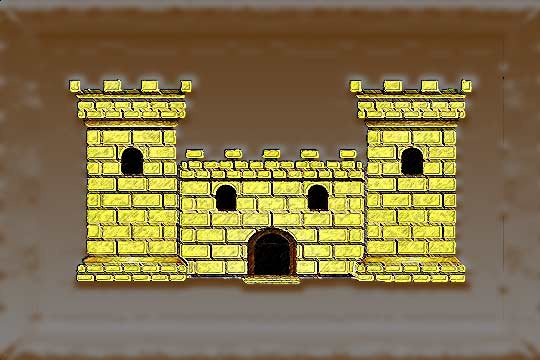Frangokastello, Sfakia, Chania,Crete
Frangokastello
| Location: |
| Frangokastelo, Sfakia area at the south-eastern coast of Crete |
| Region > Prefecture: |  |
| Crete Chania | |
| Municipality > Town: | |
| City of Sfakia • Frangokastello | |
| Altitude: | |
| Zero Altitude |
| Time of Construction | Origin | |
| 1371-1374 | VENETIAN |
|
| Castle Type | Condition | |
| Coastal Fortress |
Relatively Good
|
Frangokastello is the location of a castle and scattered settlement on the south coast of Crete, on the Libyan sea, about 12 km. east of Chora Sfakion and within the prefecture of Chania. The castle is one of the most famous of Greece because of the legend of Drosoulites.
The Name of the Castle
The Venetians named it 'Castle of St. Nikitas' after the nearby church. The locals, however, who never saw it in a positive light, contemptuously dubbed it Frangokastello, meaning the Castle of the Franks (i.e. Catholic foreigners), Castelfranco or Franco Castello. The name eventually stuck and was adopted by the Venetians as well.
History
The castle was built by the Venetians in 1371-74 as a garrison to impose order on the rebellious Sfakia region, to deter pirates, and to protect Venetian nobles and their properties. According to local stories, when soldiers and builders arrived on the fertile plain to begin construction of the castle, the local Sfakians, led by six Patsos brothers from the nearby settlement of Patsianos, would destroy every night what the Venetians built during the day. Eventually, the Venetians were forced to bring in additional troops and the Patsos brothers were betrayed, arrested and hanged.
In 1770, the Cretan rebel Ioannis Vlachos, otherwise known as Daskaloyiannis occupied Frangokastello but later he was captured by Turkish forces. He was tortured and executed at Heraklion.
On 17 May 1828 a celebrated battle was fought at Frangokastello. Hundreds of Sfakiots and Epirotes led by Hatzimichalis Dalianis, a Greek patriot from Epirus attempting to spread the Greek War of Independence from the mainland to Crete, occupied the castle, but were besieged by the Turks and massacred.
Structure, Fortification & Buildings
The castle has a simple rectangular shape, with a tower at each corner and the remains of a Venetian coat of arms above the main gate. The buildings within the walls, as well as the battlements, were constructed during the Ottoman Turkish occupation.
Legends & Tales
According to tradition, around the anniversary of the battle οφ 1828, in May or June, shadows of the armed Cretan and Epirote soldiers who lost their lives there seem to march towards the fortress around dawn. These are called Drosoulites (Greek: Δροσουλίτες), or dew-men.
The visions, as described by witnesses, consist of a group of human-like shadows dressed in black, walking or riding, armed with weapons, moving from the monastery of Agios Charalambos and advancing towards the old fort, Frangokastello.
The ghost army is led by Hatzimichalis Dalianis, from Epirus, the chief of the Greek fighters that were lost, in the battle. The army took refuge in the fort during the Greek War of Independence against the Turks, where they were killed after a seven-day siege.
The local people named them Drosoulites ("dew shadows") due to the time of day that the phenomenon is taking place. The phenomenon is observed when the sea is calm and the atmosphere is moist and before the sun goes too high up in the sky. It usually lasts about 10 minutes.
The shadows are visible from the valley at a distance of 1000 m. Many have tried to explain this in a scientific way, and at one time it was explained as a mirage from the coast of North Africa, but still there is no accepted consensus. In 1890 a transient Turkish army, took the images for rebels and fled away. Even during the Second World War, a German patrol is said to have opened fire on the visions.
| First entry in Kastrologos: | July 2012 | Last addition of photo/video: | August 2023 |
Sources
- Video and photos 1, 12-17 by Fred Kok (August 2018)
|
|
| Access |
|---|
| Approach to the monument: |
| - |
| Entrance: |
| Ticket entrance. Limited hours. |
| Timeline |
|---|
|




















